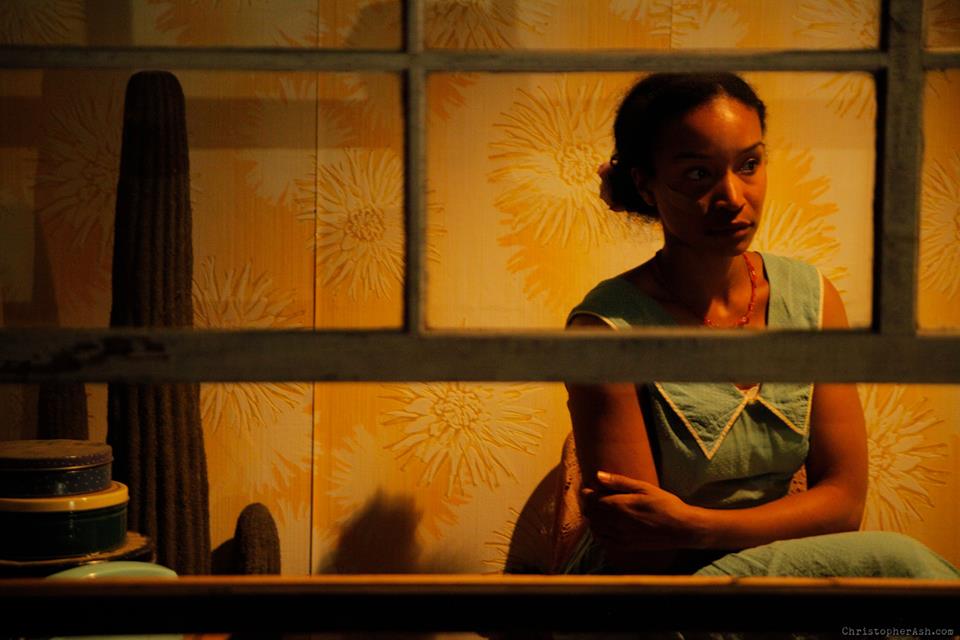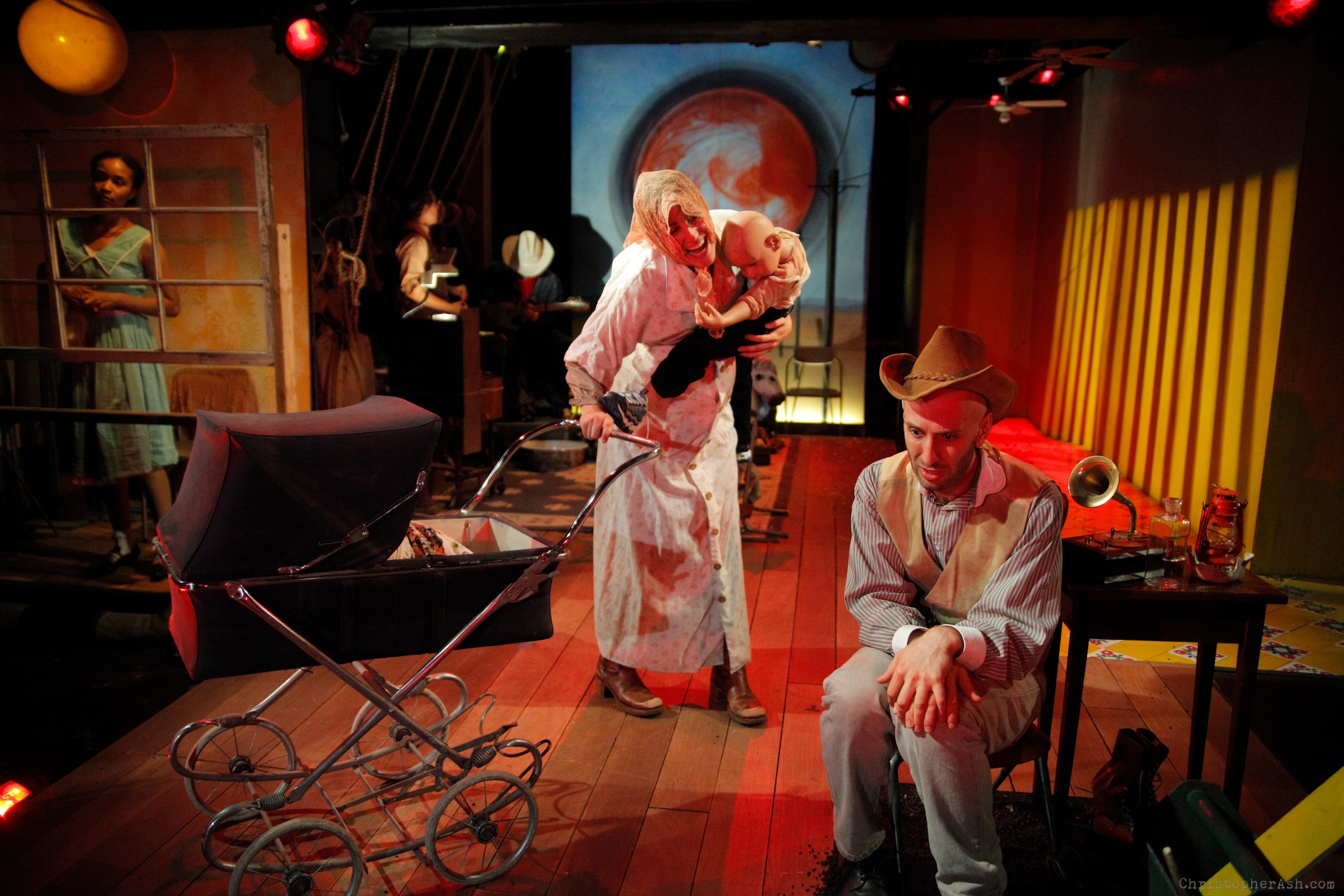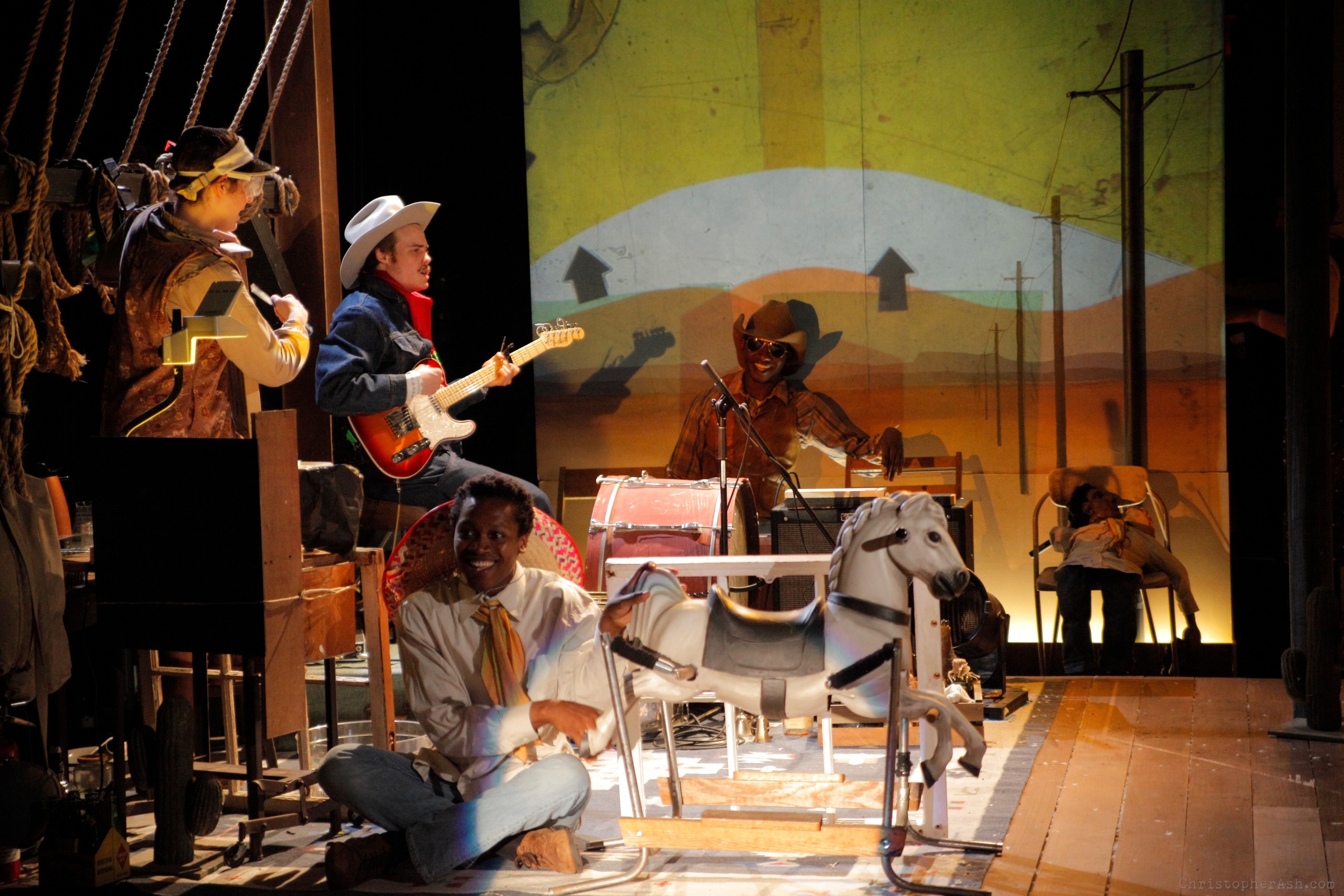Review of Blood Wedding, Yale School of Drama
Federico Garcia Lorca’s Blood Wedding receives a gorgeous staging at the Yale School of Drama. The thesis show for third-year director Kevin Hourigan—and the first of the three thesis projects this season—Blood Wedding invites us to consider the elemental force of human passion. Lorca’s three act play is here staged as two acts, an intermission, and a short final act. The division of the material is made eminently sensible given the stark change in mood that follows the close of the play’s second act, here the first part curtain.
The first part has the feel of a folkloric exploration of the mores of an Andalusian village in rural Spain in the 1920s. Cole McCarty’s handsome costumes seem so authentic, we feel ourselves in a naturalistic depiction, while Choul Lee’s scenic design gestures toward the play’s more modernist elements that will come forward in the second part. The set combines a strikingly lit tree and tall, cathedral-like panes of glass, and, in the second part, poetic lighting to suggest the influence of the moon.
Lorca eschews character names (but for Leonardo), and that lets us know that we’re in for something more stylized than naturalistic. Yet director Hourigan presents the mounting drama of the play’s first two acts with strongly delineated characters. Sebastian Arboleda plays The Groom as likeable, if none too exciting, something his Mother (Lauren E. Banks) realizes, trying to persuade him that his proposed marriage to The Bride (Sydney Lemmon) may not be in his best interests. The girl has been tainted by the reciprocal desire between herself and Leonardo (Barbaro Guzman), a horseman and the town’s resident heart-throb; his Wife (Stephanie Machado) is already pregnant with his second child, even as he has begun to suffer jealousy at the prospective marriage of a woman he wants for himself. It’s not a healthy situation, and we feel the entire village—suggested by ensemble parts played by Marié Botha, Patricia Fa’asua, Rebecca Hampe, Francesca Fernandez McKenzie, and Jennifer Schmidt—looking on to see what develops.
In the early going, the play’s tone lets us hope all may work out well. Despite The Mother’s misgivings—and Banks seethes with barely contained emotion—and her mourning for men in her family who have died by the knife over quarrels, The Groom and his Mother pay the requisite visit to the Bride’s Father (Jake Ryan Lozano, benignly patriarchal) and events pass without quarrelsome words. The Groom is encouraged because the Bride seems eager for their coming nuptials, which is reassuring given the fact that she also finds it difficult to resist Leonardo’s importunate visit. These days, it’s easy to think ill of alpha males like Leonardo, but his headstrong passion, and his efforts at self-control, are well-rendered by Guzman, in a very becoming outfit.
Lorca infuses the situation with a brooding sense of fate, as the passions presented seem elements of nature more than of individual character. The play gives rise to qualities that might make us think of a folktale, based in a collective mythos. Songs sung by the Wife and her Maid (Elizabeth Stahlmann), and the Wife’s Mother (McKenzie) create a sense of these women as a Chorus from Greek tragedy. They perceive the sorrow that the unfaithful husband adds to the Wife’s woe, but they also recognize—and this is perhaps the most telling element in Lorca’s play—the inevitability of the town’s most desirable man claiming the town’s most desirable woman. To stand between a couple in such necessary eros, Lorca’s play suggests, is to invite tragedy. Stahlmann’s just so manner as the Maid is particularly effective at conveying a knowing sense of the smoldering undercurrents here.
Key to what transpires in the second part is the unmooring of The Bride. Lemmon, regally tall in her sumptuous black costuming, seems a figure of almost uncanny power, totemic even. The hoofbeats that thunder past at one point—credit to Ian Scot’s original music and sound design—can double as her heart’s resolve overflowing its restraints. And on her wedding day, the Bride’s testiness undermines the fragile sense of unity the wedding was intended to create.
In the second part, three girls (Botha, Hampe, Schmidt) are presented in the image of the three Fates, complete with skein, visited by a mysterious enrobed figure (Banks) who dallies with them over the fait accompli of a double death. Banks’ doubling as The Mother and this more arcane figure suggests how much The Groom’s bride all along was death, to give the Mother another cause for mourning.
Also key to the more phantasmagoric elements of the second part is the monologue by The Moon, played with an affecting sense of lunacy by Lozano. The Moon’s part in all this we might understand as the mythic idea of the evil genius of a place. The Moon creates a situation where men must lose their heads, and violence inevitably results. Lorca gives us a world where moonlight is a knife, and the fact of knives leads to inevitable blood-letting. In the end, whatever sense of justice exists becomes the concern of the women—the Mother, the Wife, the Bride—bereft of their men.
With many subtle effects—not least from Erin Earle Fleming’s lighting—Blood Wedding is a stirring autumnal tale, a chronicle of deaths fore-ordained.
Blood Wedding
By Federico García Lorca
Translated by Nahuel Telleria
Directed by Kevin Hourigan
Scenic Designer: Choul Lee; Costume Designer: Cole McCarty; Lighting Designer: Erin Earle Fleming; Original Music and Sound Design: Ian Scot; Technical Director: Alexandra Reynolds; Production Dramaturg: Josh Goulding; Stage Manager: Caitlin O’Rourke
Cast: Sebastian Arboleda, Lauren E. Banks, Marié Botha, Patricia Fa’asua, Francesca Fernandez McKenzie, Barbaro Guzman, Rebecca Hampe, Sydney Lemmon, Jake Ryan Lozano, Stephanie Machado, Jennifer Schmidt, Elizabeth Stahlmann
Yale School of Drama
October 18-22, 2016





